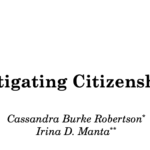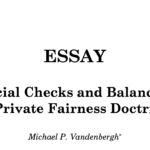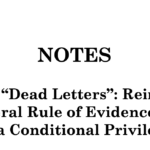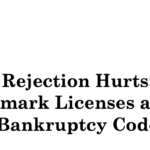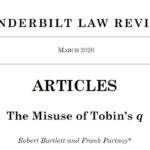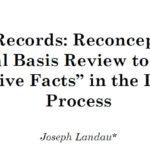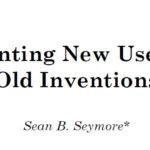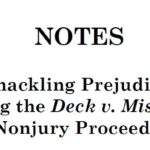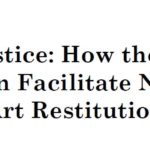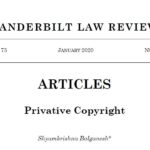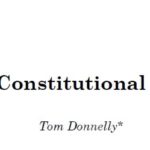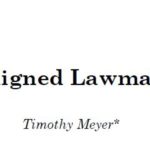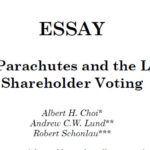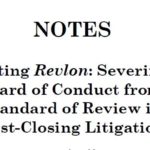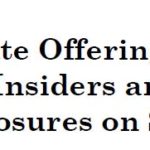Volumes Category
Litigating Citizenship
Apr. 20, 2020—Cassandra Burke Robertson & Irina D. Manta | 73 Vand. L. Rev. 757 | By what standard of proof—and by what procedures—can the U.S. government challenge citizenship status? That question has taken on greater urgency in recent years. News reports discuss cases of individuals whose passports were suddenly denied, even after the government had previously...
Social Checks and Balances: A Private Fairness Doctrine
Apr. 20, 2020—Michael P. Vandenbergh | 73 Vand. L. Rev. 811 | This Essay proposes a private standards and certification system to induce media firms to provide more complete and accurate information. It argues that this new private governance system is a viable response to the channelized flow of information that is exacerbating political polarization in the...
Reviving “Dead Letters”: Reimagining Federal Rule of Evidence 410 as a Conditional Privilege
Apr. 20, 2020—Peter G. Cornick | 73 Vand. L. Rev. 857 | Though understudied relative to its fellow specialized relevance rules, Federal Rule of Evidence 410 protects a crucial element of the criminal justice system: plea negotiations. As written, the rule prevents the admission of evidence gathered during plea discussions, which helps assure criminal defendants that their candid...
Rejection Hurts: Trademark Licenses and the Bankruptcy Code
Apr. 20, 2020—Amanda E. James | 73 Vand. L. Rev. 889 | Section 365 of the Bankruptcy Code empowers debtors to reject burdensome executory contracts. From 1988 until May 2019, the effect of such a rejection on trademark licenses was unclear. The Supreme Court’s recent decision in Mission Product Holdings, Inc. v. Tempnology, LLC settled the matter...
The Misuse of Tobin’s q
Mar. 25, 2020—Robert Bartlett & Frank Partnoy | 73 Vand. L. Rev. 353 (2020) | In recent years, scholars have addressed the most important topics in corporate law based on a flawed assumption: that the ratio of the market value of a corporation’s securities to their book value is a valid measure of the value of the...
Broken Records: Reconceptualizing Rational Basis Review to Address “Alternative Facts” in the Legislative Process
Mar. 25, 2020—Joseph Landau | 73 Vand. L. Rev. 425 (2020) | In 2016, North Carolina passed “HB2,” also known as the “bathroom ban”—a law prohibiting transgender individuals from accessing public restrooms corresponding to their gender identity—based on the unfounded fear that cisgender men posing as transgender women would assault women and girls in bathrooms. Around the...
Patenting New Uses for Old Inventions
Mar. 25, 2020—Sean B. Seymore | 73 Vand. L. Rev. 478 (2020) | A bedrock principle of patent law is that old inventions cannot be patented. And a new use for an old invention does not render the old invention patentable. This is because patent law requires novelty—an invention must be new. But while a new use...
Shackling Prejudice: Expanding the Deck v. Missouri Rule to Nonjury Proceedings
Mar. 25, 2020—Sadie Shourd | 73 Vand. L. Rev. 535 (2020) | Courts in the United States have traditionally held that criminal defendants have the right to be free from unwarranted restraints visible to the jury during the guilt phase of a trial. The term “unwarranted restraints” refers to the use of restraints on a defendant absent...
Artistic Justice: How the Executive Branch Can Facilitate Nazi-Looted Art Restitution
Mar. 25, 2020—Paige Tenkhoff | 73 Vand. L. Rev. 569 (2020) | Eight decades after the Holocaust, many pieces of art stolen from Jewish families still sit in the state-owned museums of former Nazialigned regimes. In an effort to right old wrongs, plaintiffs are bringing suit in the United States against the foreign governments who retain the...
Privative Copyright
Jan. 21, 2020—Shyamkrishna Balganesh | 73 Vand. L. Rev. 1 (2020) | “Privative” copyright claims are infringement actions brought by authors for the unauthorized public dissemination of works that are private, unpublished, and revelatory of the author’s personal identity. Driven by considerations of authorial autonomy, dignity, and personality rather than monetary value, these claims are almost as...
Popular Constitutional Argument
Jan. 21, 2020—Tom Donnelly | 73 Vand. L. Rev. 73 (2020)| Critics have long attacked popular constitutionalists for offering few clues about how their theory might work in practice—especially inside the courts. These critics are right. Popular constitutionalism—as a matter of both theory and practice—remains a work in progress. In this Article, I take up the challenge...
Misaligned Lawmaking
Jan. 21, 2020—Timothy Meyer | 73 Vand. L. Rev. 151 (2020) | Since 1962, when Congress passed the Trade Expansion Act, every new U.S. trade deal has had the same essential bargain at its core. Congress agrees to give the president the power to lower trade barriers, while at the same time providing adjustment assistance for those...
Golden Parachutes and the Limits of Shareholder Voting
Jan. 21, 2020—Albert H. Choi, Andrew C.W. Lund & Robert Schonlau | 73 Vand. L. Rev. 223 (2020) | With the passage of the Dodd-Frank Wall Street Reform and Consumer Protection Act in 2010, Congress attempted to constrain change-in-control payments (also known as “golden parachutes”) by giving shareholders the right to approve or disapprove such payments on...
Dissecting Revlon: Severing the Standard of Conduct from the Standard of Review in Post-Closing Litigation
Jan. 21, 2020—Katie Clemmons | 73 Vand. L. Rev. 267 (2020) | In Corwin v. KKR Financial Holdings LLC and its progeny, the Delaware courts made clear that a fully informed, uncoerced vote by disinterested stockholders triggers the waste standard. In Corwin, the Delaware Supreme Court also indicated that Revlon was only meant to provide stockholders with...
Inflated Private Offering: Regulating Corporate Insiders and Market-Moving Disclosures on Social Media
Jan. 21, 2020—Marisa Papenfuss | 73 Vand. L. Rev. 311 (2020) | The U.S. Securities and Exchange Commission enacted Regulation Fair Disclosure (“Regulation FD”) to prohibit companies from disclosing material information to select parties but not the public at large. The rapid advancement of technology since Regulation FD’s enactment has dramatically altered the ways companies distribute information...
Introduction: Professor Randall Thomas’s Depolarizing and Neutral Approach to Shareholder Rights
Nov. 25, 2019—James D. Cox & Frank Partnoy | 72 Vand. L. Rev. 1755 (2019) | Like Gaul, corporate law scholarship can be divided into three overflowing buckets: pro-manager, pro-shareholder, and empirical. We classify empirical scholarship as a separate category, in significant part because of Professor Randall Thomas. In the pre-Thomas era, much of the literature fell...
